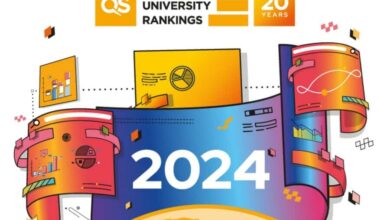Comparison between Australia and Canada for International Students

Many students are unsure whether Australia or Canada is the better option for studying abroad. It is not easy to choose between the two higher education study destinations as they both offer great educational opportunities, exceptional public services and a high quality of life. Let us help you with this complete guide to which study abroad destination is best; Australia or Canada?
Table of contents
The Australian versus Canadian education systems
The education system in Australia
Australian universities have built a global reputation for cutting-edge research and innovative teaching practices, making them a top choice for international students.
However, in Australia’s education system, a university degree represents the pinnacle of academic achievement. Australia has 39 universities, including 37 government-backed institutions and two private institutions. Bachelor’s and master’s degrees are available on campus (including certificates, postgraduate diplomas, and master’s and doctoral programs).
The purpose of vocational education is to provide students with the knowledge and experience they need to succeed in their chosen profession. Institutions such as TAFE (Technical and Secondary Education) and other private schools receive government funding to provide vocational education and training to their students.
Many community colleges grant transfer credit for successfully completing their courses.
The education system in Canada
On the other hand, Canadian universities strive to provide opportunities that improve students’ learning, careers and lives. In addition to being committed to research and high-quality teaching, university classes are a mix of lectures and tutorials.
Types of Institutions in Canada:
- University: Students can apply for undergraduate degrees, postgraduate certificates, diplomas, professional degrees and doctorates from universities across Canada.
- Colleges: Programs offered by colleges include diploma and university transfer programs.
- community schools: Students can earn a certificate, diploma, associate degree, bachelor’s degree, and postgraduate degree from community colleges.
- Career and technical colleges: Certificates and diplomas are offered for technical education.

Top 10 Universities in Australia vs Canada
When choosing between Australia and Canada, it is helpful to look at university rankings to get an idea of the quality of education offered in each country. The education systems in both Australia and Canada are among the best in the world. Check out the top 10 universities according to the QS World University Rankings:
Dual Degrees in Australia vs Canada
Have you ever thought of studying business administration while continuing to pursue your passion for music? When applying for a job, combining two undergraduate or postgraduate degrees gives you an advantage over other applicants.
|
Dual Undergraduate Degrees in Australia and Canada |
Double postgraduate degrees in Australia and Canada |
|
Bachelor of Engineering (Honours) and Bachelor of Business |
Master in Cyber Security Analysis and Master in International Relations |
|
Bachelor of Business Administration and Bachelor of Information Technology |
Master Accountancy and Master Business Law |
|
Bachelor of Laws and Bachelor of Arts |
Master Creative Industries and Master Management |
|
Bachelor Design and Bachelor Media Communication |
Master in Planning and Master in Architecture |
|
Bachelor of Pedagogy and Bachelor of Music |
Master Business Analytics and Master Management |
Types of Postgraduate Degrees in Australia vs Canada
Postgraduate degrees in Australia are broadly divided into courses or taught and research degrees.
|
Postgraduate degrees |
Duration |
|
Master’s Degree (by research) |
2 years |
|
Research doctorate (PhD) |
Up to 4 years |
|
Graduate Diploma |
6 months to 14 months |
|
Master’s Degree (by courses) |
1 year to 2 years |
|
Master’s Degree (extended) |
1 year to 2 years |
|
doctorate |
Up to 4 years |
Postgraduate degrees in Canada are divided into diplomas, courses, and programs.
|
Postgraduate degrees |
Duration |
|
Postgraduate Diplomas |
1 year |
|
Master’s programs |
Up to 2 years |
|
Doctorate courses |
Up to 6 years old |
Best 5 Scholarships in Australia vs Canada for International Students
Australia and Canada have long been home to world-class institutions and colleges, and each year a number of them offer a variety of fully-funded and partial scholarships to foreign students to help them finance their studies.
University Admission Requirements in Australia vs Canada
University admission requirements vary based on the university, field of study and level of study. However, if you want to apply to a top university in Australia or Canada, you generally need:
Visa requirements for students in Australia vs Canada
Visa requirements for students in Australia
To apply for an Australian student visa, you must create an account on ImmiAccount, the online application system for DIBP. The information required for your visa application depends on your nationality and the course you are taking. In general you need:
- Proof of enrollment (your electronic confirmation of enrollment)
- Your health insurance policy details (Overseas Student Health Cover).
- Your True Temporary Participant (GTE) statement.
- Evidence of your English skills
- A valid passport
- Your visa application fee
If you are under 18 years old, you must also provide additional documents, such as parental consent.
Visa requirements for students in Canada
The Canadian student visa is commonly referred to as a “study permit”.
Because study permit requirements can change quickly, make sure you follow the most up-to-date information. The Immigration, Refugees, and Citizenship Canada (IRCC) website is the best source to get this information.
For possibly. you can always contact us a free consultation Where we can advise you on the full visa application procedure.
Employment in Australia vs. Canada
Lots of student visas in Australia allow both part-time and full-time work during holidays. Applying for an internship program is also a good decision to gain exposure to a professional environment and actual industry experience.
If you plan reside in Canada after graduation, the Post-Graduation Work Permit Program will earn you useful work experience (PWPP). PWPP work permits are good for the duration of your first degree program (up to three years) and allow you to work at any job and change employers as often as you like.
The cost of studying in Australia vs Canada
When comparing Australia and Canada, an important factor to consider for international students is which country offers a more affordable education. Let’s compare the cost of studying for international students in Australia and Canada.
Cost of Studying in Australia
The average tuition fee at any of Australia’s tertiary institutions is between AUD 20,000 and AUD 30,000 per year.
|
Study program level |
Average annual costs in Australian dollars ($) |
|
School |
$7,800 to $30,000 per year |
|
English language studies |
$300/week (varies by course length) |
|
Vocational education and training |
$4000 – $22,000 per year |
|
Undergraduate bachelor’s degree |
$15,000 – $33,000 per year |
|
Postgraduate master’s degree |
$20,000 – $37,000 per year |
|
doctorate |
$14,000 – $37,000 per year |
*Source: Australian Government website, please note that all figures are indicative.
Cost of Studying in Canada
Your tuition expenses in Canada depend on the type of qualification and the university or school you choose. To cover this, you need between CAD 13,000 and 40,000 annually.
|
Study program level |
Average Annual Cost in Canadian Dollars ($) |
|
Undergraduate Program |
$13,000 to $20,000 |
|
Postgraduate master’s degree |
$17,000 to $25,000 |
|
doctorate |
$7,000 to $15,000 |
|
MBA |
$30,000 to $40,000 |
*Source: Canadian government website, please note that all figures are indicative.
The cost of living in Australia vs Canada
An additional factor to consider when choosing a university is the local cost of living. Wherever you decide to go, preparing a budget in advance can help you avoid financial problems.
The cost of living in Australia or Canada depends on many things, such as your lifestyle and the city you live in. Use IDP’s cost of living calculator now to get a better idea of how much money you’ll need to live comfortably in any destination.
|
Expense type in Australia |
Costs per month in Australian Dollars |
|
Hostels and guest houses (Accommodation) |
$360 to $600 |
|
Shared rental (accommodation) |
$380 to $860 |
|
On campus (Accommodation) |
$440 to $1,120 |
|
Host family (Accommodation) |
$940 to $1,300 |
|
Rental (Accommodation) |
$740 to $1,760 |
|
Internet/telephone |
$20-$55 |
|
Food |
$80-$300 |
|
Electricity/gas |
$10-$140 |
|
Transport |
$12-$65 |
|
Expense type in Canada |
Costs per month in Canadian Dollars |
|
Inns (Accommodation) |
$300 – $600 ($10 – $20 per night) |
|
Private Apartment (Accommodation) |
$400-$1500 |
|
Shared rental (accommodation) |
$250-$700 |
|
Host family (Accommodation) |
$400-$800 |
|
Internet/telephone |
$50-$76 |
|
Food |
$1200-$1500 |
|
Electricity/gas |
$200 |
|
Transport |
$100-$150 |
Best Cities for International Students in Australia vs Canada
Explore the world’s top 5 student-friendly cities, according to the QS Best Student Cities Ranking 2022, in Australia and Canada.
Talk to your certified counselor for FREE
Can’t choose where to study? Our graduate counselors were international students just like you, so they know all the tips and tricks for getting the most out of moving to a new city, and they’ll help you choose the course that’s right for you and then you go through the paperwork to get it done. Many promising opportunities are calling to you. It’s NOW the time to contact your IDP advisor!








